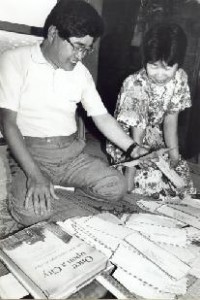The "Moral Adoption" of Hiroshima’s A-bomb Orphans, Part II [9]
Feb. 1, 2009
Finally meeting his moral mother
by Akira Tashiro and Masami Nishimoto, Special Reporters
This series of articles continues the story of the "moral adoption" of children in Hiroshima by American citizens. It was originally published in July 1988. The exact spelling of some names could not be confirmed.
Takashi Morishima, 49, a resident of Hiroshima, was worried about his "mother." Since 1950, he had received letters from her regularly, but last year even the Christmas card she always sent did not arrive. "I was worried about her," he said. "She's getting older and if anything had happened to her…" Through the window of the barber shop, a gray sky was seen.
His "mother's" name is Grace Mayor. She is a curator of photography at the Museum of Modern Art in New York. Ms. Mayor was one of the first to volunteer to be a moral parent after she heard about the orphans of Hiroshima from Norman Cousins, 73, her cousin and the architect of the moral adoption campaign.
"In my case, I was given such good support that I find it overwhelming to talk about." Mr. Morishima's halting speech revealed his feelings toward his moral mother.
Mr. Morishima experienced the atomic bombing in Kanon Town, part of Nishi Ward in Hiroshima. The bombing claimed the lives of both his father and his mother. Like many of the other children at the Hiroshima War Orphans Foster Home, he went out into the world with a single piece of baggage as soon as he graduated from junior high school. He became an apprentice at a barber shop in Hiroshima, where he was swamped with work until late at night. As each day was a struggle to simply survive with basic necessities, he did not have time to write letters to a foreign land. At the time, he did not feel a strong attachment to the connection between himself and his moral parent.
Ms. Mayor's motherly feelings for Mr. Morishima made her concerned about the young man's future. Through the Hiroshima War Orphans Foster Home, she faithfully sent letters to him, despite his lack of response: "How are you? Are you working hard? Are you happy?" And for his birthday and Christmas, she never failed to provide him with a check for 100 dollars (36,000 yen at the time, a substantial sum of money) and the words "With love."
Mr. Morishima used a portion of these monetary gifts to pay for a correspondence course to earn his barber's license. But he did not save any of the money for the future. "I was single then and I'm a pretty carefree person by nature," said Mr. Morishima with a regretful smile. "I didn't think seriously about returning my mother's kindness."
The turning point came when Mr. Morishima married one of his co-workers in 1962. His wife, Hiromi, is now 48. With a family of his own, he felt a stronger sense of responsibility. Mr. Morishima and Hiromi, whose father was a victim of the atomic bombing, set a goal to "become independent and open a barber shop." Mr. Morishima vowed to himself, "One day, I want my mother to see my shop."
"I hear that Mr. Cousins will become an honorary citizen of Hiroshima. I'm so happy to have met you, Mother, through the moral adoption campaign. I'm now working hard to open my shop next year when the Tokyo Olympic Games are held." [October 26, 1963]
As planned, the Morishima Barber Shop opened in 1964. Ms. Mayor continued to send 200 dollars a year to "Takashi" and "Hiromi." The money was invaluable to them, as they were hard-pressed to make ends meet at their new shop. Despite their difficulties, the couple took time to encourage the children at the Hiroshima Municipal Children's Home, the former Hiroshima War Orphans Foster Home. Inspired by Ms. Mayor's example, they gave cake to the children and took pictures of them.
Since then, the barber shop has become a healthy business and the couple spend their days happily with their son, a second-year student in high school. One of Mr. Morishima's customers has been helping to translate his correspondence with Ms. Mayor. Still referring to her as "mother," he has also sent her such gifts as handknit crafts made by Hiromi, a summer kimono, and a battledore.
"I want to see her once and thank her," Mr. Morishima said, a wish that has grown as time passes. Though he invited Ms. Mayor to visit Hiroshima, she was unable to make the trip. Six months after he lost touch with her, he sent her another letter, saying that he would come see her. At the end of June, he received a brief reply that said she was "filled with delighted" to hear the news.
"While she is still in good health, I want to take the time to fulfill my duty as her son," Mr. Morishima said. "I want to tell her 'Thank you' from the bottom of my heart and express my gratitude to my deceased parents, too." On August 15, with the first passport of his life, he will travel to the United States to see Ms. Mayor. The moral mother, who has been single all her life, will meet her son and grandchild for the first time on that day.
(Originally published on August 1, 1988)








